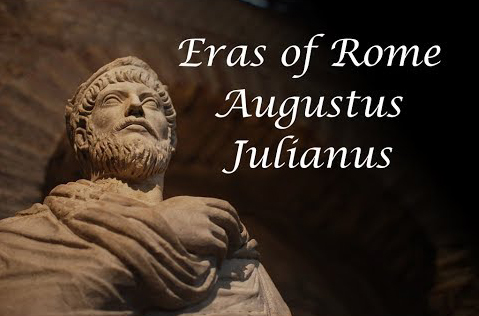Chapter XV
On 6 January, the Galileans celebrate something called the feast of the Epiphany. It is the day the Galilean is supposed to have been baptized. Suspecting my dislike of the Galileans, Nebridius announced to the city that I would attend the feast of the Epiphany at the Vienne charnel house, a brand-new basilica paid for by Helena’s numerous gifts to the bishops. I was furious but dared not show it. I am sorry to say Oribasius was amused at my predicament.
Grimly, I did what I had to do. I spent two hours meditating on the thighbone of some villain who had been eaten by lions at Rome, while the bishop delivered a considerable sermon at me, praying that I would throw the weight of my majesty against the enemy Arians. He even turned political by suggesting that as Constantius was Arian and I possibly Athanasian, the line might then be drawn between us in all things, and the side of “truth” (also the side of the majority, he added pointedly) would prevail, supporting my throne like columns, I believe was his metaphor, or it may have been holy caryatids. When it came time to pray, my words were addressed to the Galilean but my heart spoke to Zeus.
The winter was a time of waiting. I was now ready to march. All that I needed was a sign from heaven. Though the prefect at Rome would not allow my emissaries to consult the Sibylline books, a friendly priest of the old order was able to look at a part of that book which describes our period. According to his secret report, I would indeed be the next emperor. My reign would be stormy but long. That is all I ask for: time. Time to make an old world young again, to make winter spring, to free the One God from the triple monster of the atheists. Give me twenty years, O Helios, and I will fill the earth with praise for your light, and illuminate the dark windings of Hades’ kingdom! Even as Persephone returned to Demeter, so shall our time’s living-dead return to your arms, which are light, which is life, which is all! […]
* * *
“What do you want?” Oribasius had divined my mood, as he so often does.
“To restore the gods.”
“But if they are real and do exist…”
“They are real! There is no ‘if’! They do exist!” I was fierce. His laughter stopped me. “Then they exist. But if they exist, they are always present, and so there’s no need to ‘restore’ them.”
“But we must worship what God tells us to.”
“So the Christians say.”
“Ah, but theirs is a false god, and I mean to destroy them.” Oribasius stiffened at the word “destroy”. “Kill them?”
“No. I shall not allow them the pleasure of martyrdom. Besides, at the rate they kill one another, it would be gratuitous for me to intervene. No, I shall fight them with reason and example. I shall reopen the temples and reorganize the priesthood. We shall put Hellenism on such a footing that people will choose it of their own free will.”
“I wonder.” Oribasius was thoughtful. “They are rich, well organized. Most important, they educate the children.”
“We shall do the same!” I was thinking as I spoke; I had no plan. “Even better, we could take the schools away from them.”
“If you could…”
“The Emperor can.”
“It might work. Otherwise…”
“Otherwise?”
“You would have to reign as a bloody tyrant and even then you’d lose.”
“I am not so pessimistic.” But Oribasius had put an idea into my head, one which will save us all. Curiously enough, though we had often spoken of what it would be like when I became emperor, none of us had ever really considered in much detail what form the contest between Hellenism and the Galileans would take. We agreed that when I could I would publicly repudiate the Nazarene, but none of us had thought what the reaction might be, particularly from the common people of whom perhaps half are Galilean. Only the army is truly religious. The men worship Mithras. There are few Galileans in the ranks, though a third of the officers believe in the triple monster.
We talked until it was morning. Just as the sun appeared over the world’s edge, like an omen, Dagalaif returned to camp with Count Lucillianus as prisoner. […]
* * *
On the night of 20 November I was working late. Lamps filled with cheap oil smoked abominably. The three night secretaries sat at a long table, mountains of parchment stacked in front of them. At a separate table I was writing a letter to my uncle Julian, trying to reassure him—and myself—that victory was certain. I had just finished the letter with one of those postscripts which even old friends say they cannot decipher, when I heard footsteps quickly approaching. Without ceremony the door flew open. The clerks and I leapt to our feet. One never knows if assassins are at hand. But it was Oribasius, out of breath, a letter in his hand.
“It’s happened!” he gasped. Then he did something he had never done before. He dropped on his knees before me, and offered me the letter. “This is for you… Augustus.”
I read the first line. Then the words blurred together and I could read no more. “Constantius is dead.” As I said those extraordinary words, the clerks one by one fell to their knees. Then, as in a dream, the room began to fill with people.
All knew what had happened. All paid me silent homage for I had, miraculously, with the stopping of one man’s breath, become sole Augustus, Emperor of Rome, Lord of the world. To my astonishment, I wept.
